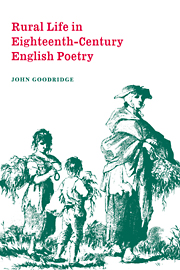Book contents
- Frontmatter
- Contents
- Preface
- Abbreviations, conventions, textual note
- Introduction
- Part I ‘Hard labour we most chearfully pursue’: three poets on rural work
- Part II ‘A pastoral convention and a ruminative mind’: agricultural prescription in The Fleece, I
- 6 Sheep and poetry
- 7 ‘Soil and clime’
- 8 Environment and heredity
- 9 The care of sheep
- 10 The shepherd's harvest
- Appendix A ‘Siluria’
- Appendix B Eighteenth-century sheep breeds
- Notes
- Select bibliography
- Index
- CAMBRIDGE STUDIES IN EIGHTEENTH-CENTURY ENGLSH LITERATURE AND THOUGHT
6 - Sheep and poetry
Published online by Cambridge University Press: 30 October 2009
- Frontmatter
- Contents
- Preface
- Abbreviations, conventions, textual note
- Introduction
- Part I ‘Hard labour we most chearfully pursue’: three poets on rural work
- Part II ‘A pastoral convention and a ruminative mind’: agricultural prescription in The Fleece, I
- 6 Sheep and poetry
- 7 ‘Soil and clime’
- 8 Environment and heredity
- 9 The care of sheep
- 10 The shepherd's harvest
- Appendix A ‘Siluria’
- Appendix B Eighteenth-century sheep breeds
- Notes
- Select bibliography
- Index
- CAMBRIDGE STUDIES IN EIGHTEENTH-CENTURY ENGLSH LITERATURE AND THOUGHT
Summary
Rereading The Fleece
In the first part of this book it was suggested that caution needed to be exercised in extrapolating social history from literature, especially from that most mystifying of literary forms, poetry. The search for information about the conditions of labour led some critics into an over-simplified division between the ‘poetry’ of Thomson and the ‘truth’ of Duck or of Collier, but there is some basis for this division. One feels in the poetry of Duck and Collier, more strongly than in The Seasons, something of the sweat and dust of the threshing floor, the wash house, and the harvest field. At the same time all three poets show signs of engagement with work-related folkloric traditions; and there are revealing ways in which Thomson's poem attempts to resolve some of the practical and ideological problems of rural labour; while Duck, and especially Collier, insist on the values of poetry as well as those of realistic documentation. Pleasure and pain are present in all the poems; as are a range of implicit and explicit ‘compensations’ for the hardship of rural labour. A nuanced reading reveals many areas in which eighteenth-century rural poetry can describe and express the experience of labour, and can tell us much about the ideologies that inform the construction of labour.
I want to turn now to a poem which places more emphasis on ‘prescribing’ than ‘describing’, though the techniques it uses to do so, which are based on Addison's interpretation of Virgil's Georgics, involve an artful blending of the two tasks, and we shall continue to measure descriptive as well as didactic and ideological meanings as we examine it.
- Type
- Chapter
- Information
- Rural Life in Eighteenth-Century English Poetry , pp. 91 - 102Publisher: Cambridge University PressPrint publication year: 1996

